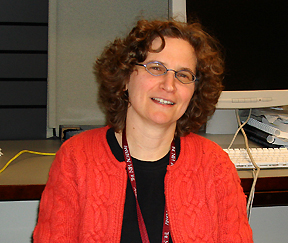WIDENING THE
HORIZONS—AND SMILES—OF
NIH TRAINEES
 |
| Sharon
Milgram |
"Great work comes from happy trainees. Happy trainees work at NIH."
This spin on an old ad campaign (about certain dairy products) is supported by empirical data. According to the Sigma Xi Postdoctoral Survey, postdoctoral fellows who participate in career and professional development activities are more productive and experience less conflict during their postdoctoral experience.
To help you make sure our trainees are productive and happy, we at the OITE have revamped our services and our style. The OITE complex now incorporates the Career Counseling Center (see column on right), open to all trainees, and three other units: the Graduate Partnerships Program (GPP), Postbac and Summer Research Programs, and the Office of Postdoctoral Services.
The recently created Career Counseling Center and Office of Postdoctoral Services (OPS) will work together to promote career development for our largest group—the postdocs.
In the coming year, we will focus on creating new programming, including courses in lab management, effective communication, leadership, and grantsmanship. We will also keeps tabs on national postdoctoral programs to ensure that NIH is out front in attracting, retaining, and providing services for fellows.
Another initiative in the OITE is to provide more diverse and comprehensive training, incuding programs to help guide trainees through tricky work-related situations, such as interactions in large multicultural teams and handling conflict.
We are creating teaching initiatives, including a new course—"Scientists Teaching Science"—and programs for trainees to visit local liberal arts colleges to get a first-hand look at what faculty positions at such institutions are like.
We are also expanding our ESL offerings and will soon provide workshops for supervisors who want to mentor and train students more effectively at all educational levels.
A priority is to give all NIH trainees access to OITE services. We are routinely traveling to other campuses, improving our videoconferencing capabilities, and clustering activities so that when off-campus trainees attend our events, they have a full day of useful workshops, discussions, and presentations to make it worth their while.
Two such "clustered" events are the First Annual Career Symposium on April 9, which will provide 15 discussion panels on a variety of biomedical careers, including science writing, undergraduate teaching, science policy, and research-intensive careers in all sectors. Panelists with varied educational experiences and backgrounds were invited to this inaugural event organized by the Fellows Committee, the Graduate Student Council, OITE, and other NIH offices.
We
are also holding a graduate and medical school
fair in July. We plan to offer workshops to help our summer
interns and postbacs prepare strong applications for graduate and professional
schools, and we will welcome representatives from up to 80 institutions
who are coming to recruit our students and learn about our excellent training
programs. Please visit our website
for
updates on our events and encourage your trainees to stop by the OITE
to get acquainted with our staff and services. If you have ideas you’d
like to share, call me at 301-594-2053 or send me an e-mail.
![]()
by
Caroline Small
OITE communications intern
The Office of Intramural Training and Education (OITE) has opened a Career Counseling Center in Building 2, the first at NIH focused on meeting the needs of the nearly 5,000 trainees, from postbacs to postdocs, who came to NIH to expand their research universe and launch their careers.
OITE Director Sharon Milgram identified the need for trainee-oriented career counseling as her top priority when she arrived at NIH in early 2007. Trainees expressed feeling lost in their careers had often sought information on career opportunities both at and away from the bench. The OITE staff had addressed these needs by acting as career advisors and assisting with CV and résumé development.
Counselors assist with self-assessment, understanding career options, and developing the means to meet career goals. They also offer mock interviews and help trainees apply to graduate and professional school and for jobs in all fields. Upon request and at no charge, they administer the Strong Inventory, which helps identify an individual’s specific career interest, and the Myers-Briggs Type Indicator, which helps analyze an individual’s working style and personality type.
The OITE staff anticipates additional hiring, including an employer development specialist to connect trainees with worldwide employment opportunities.
"This is just the beginning," says Pat Sokolove, OITE deputy director.
The
Career Counseling Center is open to all trainees. To sign up for an
appointment with a counselor, check the OITE
website under
"Opportunities for Current Trainees."
![]()